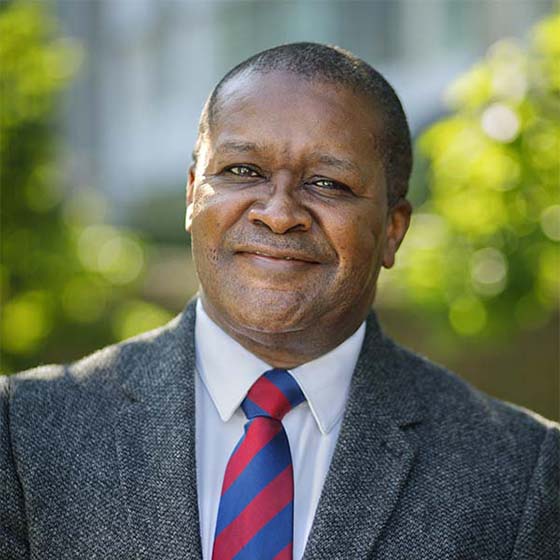
- Graduate Field Affiliations
- Chemical Engineering
- Materials Science and Engineering
- Sustainable Energy (minor)
Biography
Lynden Archer joined the Cornell University faculty in 2000. He received the Ph.D. degree in chemical engineering from Stanford University in 1993 and a B.S. degree in chemical engineering (polymer science) from the University of Southern California in 1989. During the period 1993-94 he was a postdoctoral member of the technical staff at AT&T Bell Laboratories, and from 1994-1999 was a member of the chemical engineering faculty at Texas A&M University. During the period 2010-2016 he served as the Director of the School of Chemical & Biomolecular Engineering at Cornell, and in fall of 2017 was appointed Director of the Cornell Energy Systems Institute. Prof. Archer is a fellow of the American Physical Society and a Member of the National Academy of Engineering.
He was elected the Joseph Silbert Dean of Engineering on July 1, 2020.
His research contributions have been recognized with a variety of awards, including the National Science Foundation award for Special Creativity, the American Institute for Chemical Engineers Centennial Engineer & Nanoscale Science and Engineering Forum awards, and the Thompson-Reuters “World’s Most Influential Scientific Minds” recognition in Materials Science. At Cornell, his contributions to teaching have been recognized with the James and Mary Tien’s award for excellence in teaching and thrice by Merrill Presidential Fellows as the most influential member of the Cornell University faculty.
Research Interests
Prof. Archer’s research focuses on structure, dynamics, and transport phenomena at liquid solid interfaces. This interest ranges from fundamental science studies of how condensed liquid phases (polymers, particles, ions) move and partition near interfaces, to applications-motivated studies centered on understanding how molecular scale fluid motions at interfaces influence behaviors on macroscopic length scales. In one class of problems Archer and his students investigate how and why motions of polymers at interfaces impact the classical no-slip hydrodynamic boundary condition taken for granted in analyzing all liquid flows. Extensions of these ideas to the design of novel self-suspended inorganic-organic hybrid materials, which allow interfacial polymer phase behavior to be isolated and studied from bulk experiments is an area of significant ongoing work. Applications of these concepts to create electrolytes and artificial solid electrolyte interphases able to regulate chemical, morphological, and hydrodynamic stability at interphases in electrochemical cells has likewise emerged as fruitful area of study in the Archer group.
- Fluid Dynamics and Rheology
- Polymers and Soft Matter
- Energy Systems
- Nanotechnology
- Complex Fluids and Polymers
- Nanoscale Electronics, Photonics and Materials Processing
- Sustainable Energy Systems
Teaching Interests
Electrokinetics; Fluid Mechanics; Polymer Physics; Thermodynamics; Transport Phenomena.
Select Publications
-
Choudhury, S., D. Vu, A. Warren, M. D. Tikekar, Z. Tu, and L. A. Archer. 2018. “Confining electrodeposition of metals in structured electrolytes,” Proc. of the National Academy of Sciences 56: 1-9
-
Zachman, M. J., Z. Tu, S. Choudhury, L. A. Archer, L. F. Kourkoutis. 2018. “Cryo-STEM mapping of solid-liquid interfaces and dendrites in lithium-metal batteries,” Nature 560: 345-349
-
Wei, S., Z. Cheng, P. Nath, M. D. Tikekar, G. Li, and L. A. Archer. 2018. “Stabilizing electrochemical interfaces in viscoelastic liquid electrolytes,” Science Advances 4: eaa06243
-
Tikekar, M.D., S. Choudhury, Z. Tu, L.A. Archer. 2016. “Design principles for electrolytes and interfaces for stable lithium-metal batteries,” Nature Energy 1: 6-12.
-
Mangal, R., S. Srivastava and L.A. Archer. 2015. “Phase stability and dynamics of entangled polymer–nanoparticle composites,” Nature Communications 6: 7198.
Select Awards and Honors
- Elected National Academy of Engineering 2018
- National Science Foundation Distinguished Lecturer in Mathematical & Physical Science 2016
- 10 Ideas that will Change the World - Batteries that Eat Carbon, Scientific American 2016
- AIChE Nanoscale Science and Engineering Forum (NSEF) Award (AIChE) 2014
- Merrill Presidential Scholar, Most Influential Faculty Member, Cornell University 2014
- Thompson-Reuters, World’s Most Influential Scientific Minds - Materials Science 2014, 2015
- Award for Special Creativity, National Science Foundation, DMR 2013
- James & Mary Tien Excellence in Teaching Award, College of Engineering, Cornell University 2008
- KAUST Global Research Partnership Award 2008
- Fellow, American Physical Society 2007
Education
- B.S., Chemical Engineering, University of Southern California 1989
- Ph.D., Chemical Engineering, Stanford University 1993
- Postdoctoral Scientist, AT&T Bell Laboratories 1993-1994